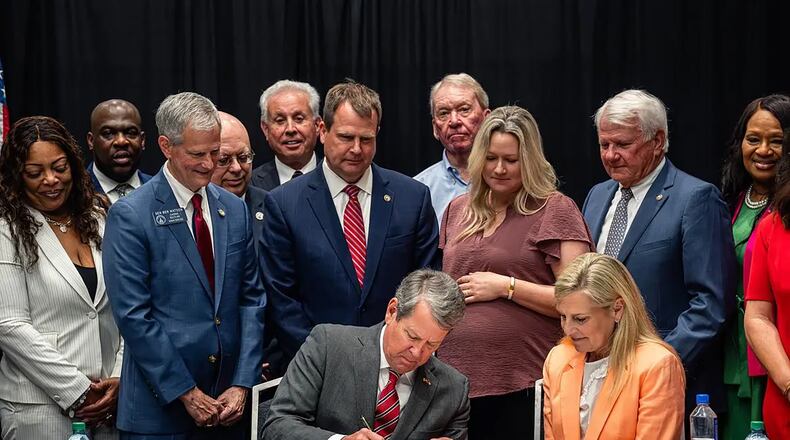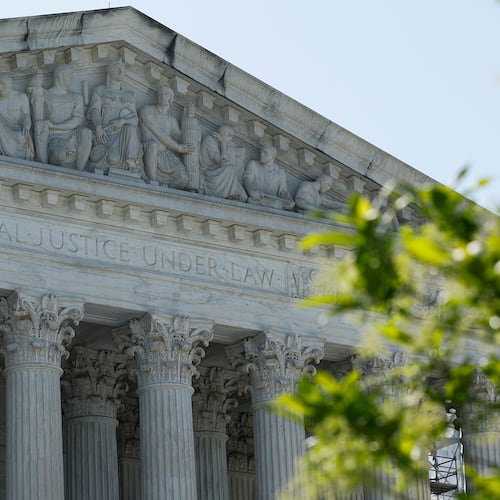SAVANNAH ― Lorie Franklin is due to give birth to her and husband Lehman’s first child, a girl, on May 27, but her advanced pregnancy didn’t keep her away from a bill signing Thursday at the Savannah Convention Center.
Gov. Brian Kemp signed legislation ensuring couples like the Franklins, who conceived via in vitro fertilization, would continue to have access to the medical procedure.
Lehman Franklin, a Republican state representative from Statesboro, sponsored House Bill 428 that enshrines access to IVF in state law. The bill was a bipartisan effort to safeguard the procedure following a 2024 Alabama Supreme Court ruling called the procedure into question, sparking national concern.
“IVF is modern miracle for families who yearn for the joy of having a child,” said Kemp, who signed the bill flanked by the Franklins.
The Franklins conceived only after multiple failed rounds of IVF and an adoption plan that fell through. They first sought to adopt eight years ago and turned to IVF in 2020.
Franklin’s bill drew support across party lines as lawmakers reacted to the Alabama Supreme Court decision that declared frozen embryos could be considered children under state law. That ruling sowed confusion across the fertility industry over worries that destruction of unused embryos could violate the state’s law against the wrongful death of a minor.
Georgia House Speaker Jon Burns, R-Newington, was among the state leaders who, in Kemp’s words, “laid down a marker” that Georgia would protect IVF in the wake of the court decision. Burns attended Thursday’s bill signing and said “decisive action was required” from the General Assembly.
Franklin took on the challenge — and found a receptive group of lawmakers. Almost every legislator he talked to voiced a personal experience, either directly or indirectly, with IVF. Those stories, which Franklin relayed to his wife, made the couple feel less “alone.”
“And it just emphasized how important protecting IVF is,” Lorie Franklin said.
Alabama has since passed a law shielding fertility clinics from liability, but the ripple effects reached Georgia, where IVF has been a widely accepted medical option for decades. More than 2,300 children were born through IVF in Georgia in 2021, according to state records.
President Donald Trump has also weighed in, issuing an executive order to reduce the cost of IVF and pledging support for the procedure amid pushback from some conservatives. State Sen. Ben Watson, R-Savannah, who sponsored the bill in the state Senate, said IVF could also help boost the U.S. fertility rate, a recently voiced priority of Vice President JD Vance.
The IVF process involves fertilizing eggs outside the womb, with embryos either implanted in the uterus or frozen for future use. Many embryos go unused — and may be discarded, donated to science, or given to others seeking children — raising legal questions in states with strict anti-abortion provisions.
Those questions intensified after the U.S. Supreme Court overturned Roe v. Wade in 2022, clearing the way for states to enact strict abortion bans. Legal experts warned that measures like Georgia’s “heartbeat” law — which restricts abortions once fetal cardiac activity is detected, typically around six weeks — could also endanger IVF access.
But unlike Alabama’s ruling, Georgia’s law includes a key distinction. While it defines an embryo as an “unborn child,” that status applies only if the embryo is “carried in the womb.”
Keep Reading
The Latest
Featured






